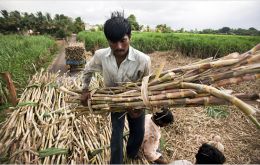MercoPress. South Atlantic News Agency
Tag: ethanol
-
Thursday, September 26th 2013 - 21:04 UTC
A sugar rush that could fuel the economy

By R. Viswanathan (*) - India should take its cue from Brazil and invest in ethanol as a viable commercial substitute for costly petrol.
-
Wednesday, July 11th 2012 - 22:09 UTC
OECD/FAO anticipate promising future for farm-commodity prices

World farm commodity prices will edge higher in the next decade, and oilseeds are set to outperform wheat and other cereals, both trends fuelled by demand in emerging economies, the OECD said on Wednesday, presenting a joint report with the UN's food agency FAO.
-
Wednesday, January 4th 2012 - 06:06 UTC
US is ending three-decade subsidies on corn ethanol

The US government is ending a three-decade-old policy of subsidizing corn ethanol, but it appears that the loss of the 6 billion dollars annual benefit will have little impact on farmers.
-
Saturday, October 29th 2011 - 03:04 UTC
US bio-fuel production increase: fact or wishful thinking?

A recent study, released on 11 October, “Bio-fuel Markets and Technologies” released by Pike Research states that the global bio-fuel market will double within the next decade to 183.3 billion dollars from its current level of 82.7 billion, with ethanol production accounting for 78 billion of future worldwide bio-fuel production, while predicting that bio-diesel production will reach 25.5 billion.
-
Wednesday, August 31st 2011 - 08:34 UTC
Global production of bio-fuels increased 17% last year reaching 105 billion litres

Global production of bio-fuels increased 17% in 2010 to reach an all-time high of 105 billion liters, up from 90 billion liters in 2009.
-
Tuesday, July 19th 2011 - 06:05 UTC
Brazil to cut ethanol content in gasoline to ease pressure on sugar market

Brazil will reduce the ethanol content in gasoline in another effort to contain inflation since sugar (and ethanol) prices because of a poor crop have been soaring, according to the Sao Paulo press.
-
Wednesday, June 8th 2011 - 23:32 UTC
Brazil unveils plan and incentives to boost ethanol production

Brazil's government unveiled new financing and other incentives for sugar cane ethanol production, vowing to work closely with the private sector to boost production in an industry that has struggled recently despite its immense promise.
